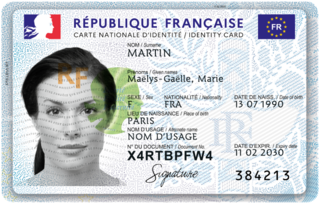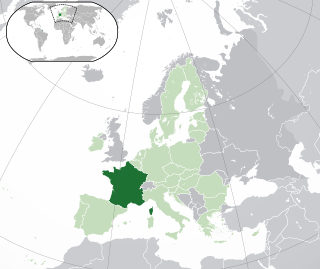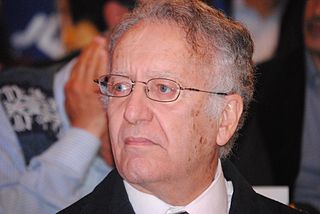The Commission of Inquiry on the Situation of the French Language and Linguistic Rights in Quebec was established under the Union Nationale government of Jean-Jacques Bertrand on December 9, 1968.

The French national identity card is an official identity document consisting of an electronic ID-1 card bearing a photograph, name and address. While the identity card is non-compulsory, all persons must possess some form of valid government-issued identity documentation.
The Gayssot Act or Gayssot Law, enacted on 13 July 1990, makes it an offense in France to question the existence or size of the category of crimes against humanity as defined in the London Charter of 1945, on the basis of which Nazi leaders were convicted by the International Military Tribunal at Nuremberg in 1945–1946.

Lesbian, gay, bisexual, transgender (LGBT) rights in France have been among some of the most progressive in the world. Although same-sex sexual activity was a capital crime that often resulted in the death penalty during the Ancien Régime, all sodomy laws were repealed in 1791 during the French Revolution. However, a lesser-known indecent exposure law that often targeted LGBT people was introduced in 1960 before being repealed twenty years later.
The Mouvement contre le racisme et pour l'amitié entre les peuples is an anti-racist French NGO, founded in 1949. Mouloud Aounit was its first general secretary (1989–2004), then president (2004–2008), then member of the presidential college (2008–2011) not to belong to the French Communist Party (PCF).
The Human Rights League was founded in Belgium on 8 May 1901, after the in 1898 established Ligue des Droits de l'Homme in France. The Belgian initiative came from Eugène Monseur, a professor at the Université libre de Bruxelles.
Racism is a significant social issue in French society. Antisemitism, as well as prejudice against Muslims and other non-Christians, have a long history. Acts have been reported against members of resident minority groups including Jews, Berbers and Arabs. However, the number of racist acts in France remains low compared to other nations. Most racist acts have a religious connotation: police data indicates 1,052 anti-Christian, 687 anti-Jewish and 154 anti-Muslim acts were perpetrated in 2019 for a total population of over 67 million. The same data indicates a total of 1,142 acts classified as "racist" without a religious connotation. This does not take into account invisible discrimination at work and in everyday life.

Yadh Ben Achour is a Tunisian lawyer, expert on public law and Islamic political theory. President of the Higher Political Reform Commission of Tunisia, he is then member of the United Nations Human Rights Committee.

Pierre Renaudel (1871–1935) was a French socialist politician and a journalist. He was born in Morgny-la-Pommeraye, Seine-Maritime, northern France, and died in Sóller, Majorca, Balearic Islands, Spain.

Jean-Paul Lehners is a Luxembourgish historian specialized in the field of global and demographic history. He is also involved in the study of human rights. Lehners is professor of global history and holder of the UNESCO Chair in Human Rights at the University of Luxembourg.

The French Commission on renewal and ethics in public life, nicknamed Jospin commission, was a think tank established in 2012 by President François Hollande to provide reforms in public life.
Sidiki Kaba, is the keeper of the seals and the Minister of Justice of Senegal since 2013. On 8 December 2014, he was elected as President of the Assembly of States Parties to the Rome Statute of the International Criminal Court as consensus candidate from the African States Parties and endorsed by the Bureau of the Assembly. He will serve as President of the Assembly, which operates from New York and The Hague, while also continuing his functions as Minister of Justice from Dakar.

Human rights in Senegal are generally better respected than in other countries in the continent, but cases of violation are still regularly reported.
Anti-Asian racism in France refers to discrimination that is faced by individuals of Asian descent in France.
Ditshwanelo, or the Botswana Centre for Human Rights, is a human rights organisation founded in 1993 in Botswana. It aims to improve human rights through education and governance. The group has campaigned against capital punishment and for LGBT rights. For its advocacy it has received awards from the Commission nationale consultative des droits de l'homme and OutRight Action International.
The Primo Levi center is a care center in Paris for people who are victims of torture and political violence in their country of origin and today refugees in France. These people are seen by doctors, psychologists and a physiotherapist. They can also receive the help of a social worker and a lawyer.
The global security law is a French legislative text promulgated on 25 May 2021. It is intended to
The Study Mission on the Spoliation of Jews in France, also known as the Mission Mattéoli, was set up in March 1997 by Alain Juppé, then Prime Minister, and chaired by Jean Mattéoli.
Adolphe Steg was a Czechoslovak-born French urologist and Holocaust survivor.

Chems-eddine Mohamed Hafiz, born 28 June 1954 in Algiers, is a Franco-Algerian lawyer, rector of the Grand Mosque of Paris since 11 January 2020.







